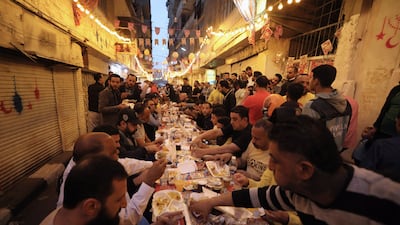Ramadan is expected to begin on March 11 or 12 this year and will prompt hundreds of millions of able-bodied Muslims around the world to abstain from eating or drinking from dawn until sunset each day for a month.
The official start date remains unconfirmed but will be determined by each country's Islamic authority depending on the sighting of a new moon.
As Muslims fast, they will be performing one of the central elements of Ramadan and fulfilling one of the five pillars of Islam.
What are the five pillars of Islam?
These mandatory pillars comprise the basic tenets of Islam and are considered the foundation of life for Muslims. Along with fasting, the other four pillars include prayer, giving alms or zakat, performing Hajj and the shahada — a declaration of faith whereby a Muslim professes that there is only one God (Allah) and Prophet Mohammed is his messenger.
Although fasting takes centre stage during Ramadan, it is not exclusive to the holy month. Many devout Muslims choose to fast each Monday and Thursday, as the prophet recommended, and on Arafat Day, the day before Eid Al Adha.
But fasting is not all that is expected of Muslims during Ramadan. Devotees must also be extra careful not to commit any sins during the holy month, including lying or swearing. Increased piety, tolerance and patience are also key to a successful Ramadan, of which the objective is effective self-discipline — where God’s orders are obeyed even when no one is watching.

Why do Muslims fast in Ramadan?
By abstaining from eating and drinking all day, Muslims who are able to fast remove the distraction of food, and come to understand and empathise with the less fortunate.
"Fasting the month of Ramadan is one of the pillars of Islam imposed on Muslims. It increases piety and makes people feel for their fellow humans who may be hungry and have no access to food," Dr Ahmed Al Haddad, the Grand Mufti of Dubai, told The National.
"It purifies the soul with virtuous morals because a fasting person should not swear, become angry or reciprocate bad deeds."
He said fasting helps brings Muslims closer to God and has great health benefits.
Removing the urge to eat and drink encourages people to think past impulses, practice patience and focus on issues that feed the soul instead.
When was fasting introduced?
The notion of fasting was revealed to the Prophet Mohammed in a Quranic verse during the second year of the Hijri calendar – the year the prophet moved from Makkah to Madinah.
"Oh you who believe! Prescribed for you is the Fast, as it was prescribed for those before you, so that you may deserve God's protection (against the temptations of your carnal soul) and attain piety," the Quran says.
From then on, fasting during Ramadan was made mandatory for all Muslims – except in certain circumstances.
When are Muslims exempt from fasting?
Exemption from fasting extends to Muslims who are sick, pregnant or travelling a long distance. Muslims are also exempt from fasting if they are menstruating or have not yet reached puberty.
What are the benefits of fasting?
The religious benefits for fasting are said to be vast. The prophet is believed to have said, “whoever fasts Ramadan with good faith and expecting God’s reward, will have their pasts sins erased”.
Dr Al Haddad said fasting unifies Muslims around the world and is beneficial to society.
"During the month of fasting, people are more compassionate and forgiving of one another, and they do good for each other," he said.
"Throughout Ramadan, souls rise to excellence and rivalries diminish."
There are also numerous health benefits of fasting, including reducing inflammation and improving gut health.
*A version of this story first appeared in The National in May 2019.

